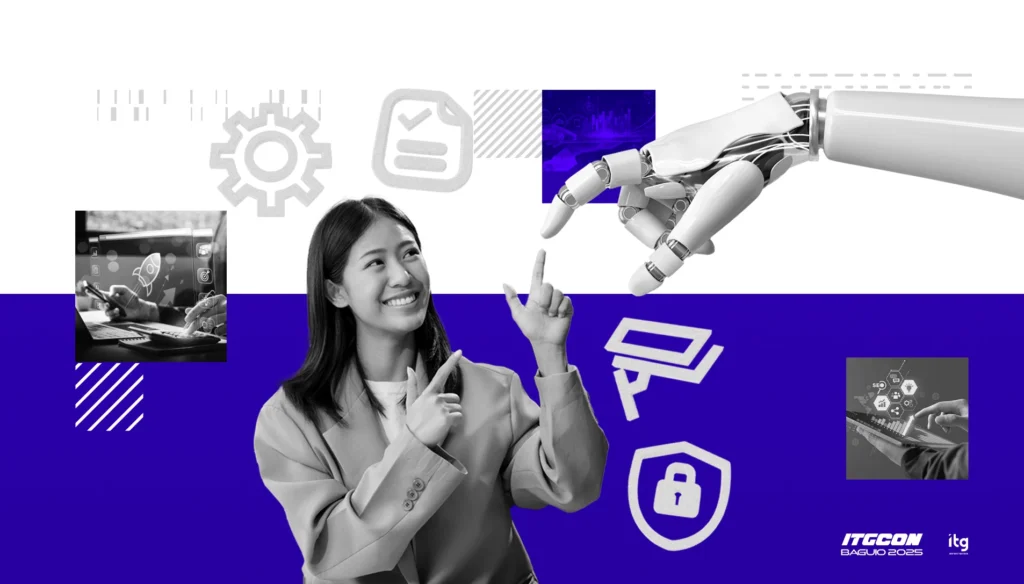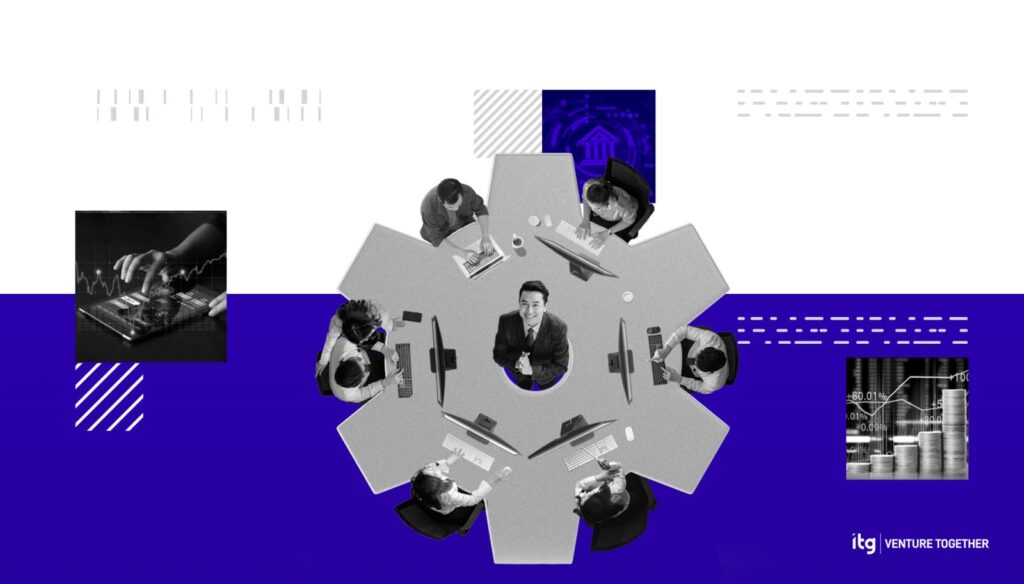
5 Ways How Digitalization Helps the Retail Industry
June 7, 2024 | Blog
Tech is both an investment and a liability. When done right, tech can help and empower your business to expand and grow. When done wrong, you’ll be tech-rich yet lowered in value, and it becomes more of a liability than an asset as it doesn’t boost your company’s profitability, yet you’re keeping it at a cost. So, how do we exactly position a smart investment in technology for your investment? Simple. Know about digital transformation and see what solutions benefit you the most.
IT Group, Inc. (ITG) has been in the tech industry for 21 years, a leading IT Solution Partner in the Philippines and ASEAN region. As a company that provides digital transformation services alongside our technological partners, we’re here to give you insights into why digital transformation or the DX journey is an important tech investment. Today, we focus on the sector where digital transformation can be seen, from B2B transactions to B2C experiences– the retail industry.
What is Digital Transformation?
So, what exactly is digital transformation? According to the CIO article by Mary Pratt and Clint Boulton, it is defined as “the integration of digital technologies into all aspects of business operations.” They shared that digital transformation aims to elevate the existing processes, improving the efficiency and cost-effectiveness of products and services a business can offer.
In recent years, digital transformation has been part of the retail industry, and for those years, many have changed. “Digital transformation became a key strategic initiative in the mid-2010s, as mobile communications, cloud, data analytics, and other advanced information technologies took off, enabling businesses and consumers to easily engage via digital channels,” they said.
How Digitalization Helps the Retail Industry
Business Operations
But how exactly does digital transformation create a positive impact on business operations in retail? Let’s take a look at what the retail industry looks like in the present day. Best example: your favorite department store near you. As you know, a department store is a retail establishment where customers go for products and services they need. Imagine this: your favorite item you’re looking for isn’t there, and you’re in a hurry. Call the staff for assistance, and with one click in their system, they restock immediately and give you what you need without the hassle. That’s how digital tech works, software specifically for inventory. A perfect scenario where digital transformation helps elevate business operations and customer experience at the same time. Meanwhile, in the B2B side of the story, as the department store invested in such technology to elevate their inventory, they were notified ahead of time that your specific item was currently running low (as it was an on-demand product), alerting the team to restock and order ahead of time.
Also read: Tech and Business Insights for 2024
In the McKinsey and Company article Technology, jobs, and the future of work by James Manyika, he shared how tech disrupts the digital and business operation processes. “Automation, digital platforms, and other innovations are changing the fundamental nature of work. Understanding these shifts can help policy makers, business leaders, and workers move forward,” he said.
As a retail company, regardless of what product and services you are offering, the visibility of your inventory, supply, and other materials needed for your business. Oracle NetSuite, ITG’s technological partner, offers the #1 Cloud ERP for companies seeking a 360-degree view of their company from beginning to end processes.
Finance Management
Digital transformation, meanwhile, in finance management helps to revolutionize the work and process. Before, many companies relied on manual accounting processes, which took time and, more often than not, had inaccurate data due to human error. Today, with the power of digital transformation, businesses can now elevate their financial processes through computerized accounting systems. In the same CIO article by Pratt and Boulton, they shared that when commercial internet happened, plus the high-speed bandwidth and mobile technologies in the first decade of the 21st century, it waved digitalization through its way to modern-day business, and “people started to shift from in-person, analog interactions to online transactions.”
Also read: Practical Tips and Insights for Controllers and CFOs
This is true as the sudden shift from manual to digital felt in the retail industry, especially when e-commerce was born. Rebeca Bichachi from Oracle NetSuite shared that financial retail finance management in this day’s era encompasses and involves not only the accounting processes but the whole business operation of an organization. “The goal of retail financial management is not just to drive sales and meet demand in the short term, but to also build a scalable operation that can grow and evolve with customers and drive long-term return on investment (ROI),” she said. “The challenge for many retailers is to manage their financial operations efficiently as they grow and increase in complexity. This requires a more unified and agile approach to financial management, powered by exact data that supplies key insights into financial performance. The result is better-informed business decisions that keep retailers on an upward trajectory.”
As the #1 Cloud ERP, Oracle NetSuite provides solutions that understand the struggle of innovating from traditional accounting systems to modern accounting software, along with ITG, business owners and key leaders can explore their options, guided by facts, and back-up with the tech experts.
Upskilling and Training
When e-commerce was born, the retail industry had to adapt to the business landscape it offers. It includes people who need to upskill and train with the new wave of technologies to do business. In the late 90s, e-commerce was new and still challenging to pitch. In the same decade, Jeff Bezos, founder and owner of one of the biggest e-commerce companies, Amazon, proved that technology in the retail industry revolutionized how we reach customers and elevate their experiences with us. The customer-centric attitude led him from the simple idea of providing an online bookstore where customers can discover, explore, and buy it online to a company that sells everything to anyone worldwide.
Also read: 7 Ways to Get Your Business Successful this 2024
But as history taught us no better, change comes with the good and the bad. In this scenario where e-commerce had to compete with conventional retail stores, affecting jobs, creating new opportunities, and emerging tech skills and training for the new landscape of the industry, it demands businesses and employees to anticipate the shift of the retail ecosystem. Some companies that can’t keep up with the wave of digitalization have experienced underwhelming success to the endpoint of bankruptcy, leaving employees with a scarcity of jobs. Meanwhile, others adapt to the change and slowly but surely thrive over the years. The key for the retail industry to this day is to include digitalization in their businesses, especially in the workforce.
Now that every business includes digitalization—one way or another, it’s crucial that when investing in new technology, it’s best to have a solution provider that can help and understand your business goals and needs and will offer you a solution that fits your current situation, like ITG and Oracle NetSuite where co-creating and co-owning a solution that tailored fit to your business needs as they offer not only a solution but also training and seminars to upskills employees, making them equipped with the software they need to use, especially when it comes to the retail industry.
Compliance
Most businesses don’t talk about how taxing, expensive, and complicated it is to adhere to compliance. On top of that, regulations and requirements differ for each industry and vary from region to region. In retail or business in general, tax compliance is a must. So, the impact of digitalization on tax compliance, for example, is a big help in removing the heavy load of any organization to comply with tax regulations, especially if you’re in an enterprise-level company. It helps companies boost efficiency and cost-effectiveness, ensuring they comply with tax regulations and avoid penalties. Think about how many receipts, invoices, and paperwork you must check and validate whether or not you complied. With tons of manual labor work to ensure we provide customers and clients with accurate real-time invoices, digitalization is the only way.
Also read: A Guide For Your BIR CAS Application
ITG and Oracle NetSuite offer the #1 Cloud ERP that helps businesses comply with their tax requirement by providing a solution to enhance their traditional accounting with a modern-day computerized accounting system. Aside from tax regulations, another compliance that organizations are pressured and required to is sustainability. In the KMPG report, Brett Weaver shared the importance of tax compliance in retail, especially when it comes to environmental, social and governance compliance. “The impact of ESG in the retail sector extends throughout the entirety of the supply chain,” he said. “From an ESG perspective, retailers tend to focus intensely on their supply chains,” Weaver reports.“They look at the ESG impacts of their product designs, packaging, and production. Many retailers have issued commitments to reducing their carbon emissions. Some have pledged to become net-zero on carbon emissions at some point in the future.”
Customer Experience
If there is one truth about digitalization —it’s only about making the customer and client experience memorable. Compared to other industries, retail is most likely engaged in B2C transactions and B2B experiences, and there’s no doubt that smooth, fast, and easy transactions will always get good customer feedback, plus how satisfied they are with the product you’re selling. Digitalization helps improve the retail experience in many ways. First, it helps you get faster and easier ways to get the info you need, the product they ask for, and who you are dealing with. With software like Oracle NetSuite Cloud ERP, you’ll have inventory visibility and streamline your business processes without bottlenecks in delivering your products.
Also read: ITG Story: Meet Our Unsung Heroes and Know Their Inspiring Stories
Second, with the data and information you’ll get from your customers and clients, your business leaders and key decision makers can make a data-driven decision based on analytics, thanks to real-time and accurate data gathering, it’s called Customer Relationship Management or CRM. As the #1 Cloud ERP, Oracle NetSuite provides a CRM tool to help you better analyze and understand your customers. It includes buyers’ behavior, pattern, age, name, and overall profile Bernard Marr, a Forbes writer, columnist, and book author renowned for his tech insights and future trends, shared that digital transformation really impacted business models on how to approach customers. “Its impact can be seen across every industry, driven by the growth in online business and the ongoing digitization of business and society,” he said.“By leveraging emerging technologies, businesses can refine elements of the model to increase the amount of value generated, reduce costs incurred by operations and processes and even create new products and services more aligned with the changing needs of their customers.”
Let’s Venture Together
For over 21 years of expertise, ITG has been the leading IT Solution Partner in the Philippines and the ASEAN region. ITG is your leading technology partner for system-wide innovative solutions to accelerate your business plans and goals, delivering seamless integrations and processes, from Business Management Solutions, IT Management, Integration & Automation, and Enterprise Data Management to IT Infrastructure. We are also an ISO 9001:2015 Certified company with regional offices located in Indonesia, Singapore, and Malaysia, helping 200+ clients across the region on their digital transformation journey, along with our technological partners, gaining a solid portfolio of 250+ successful projects.
As we all navigate toward modern-day doing business, let’s navigate your digital transformation journey to achieve your business goals and have smart digital investments for your company. Learn more about how we can help you harness the power of digital transformation today.
Shaping the Future of Technology: The Impact of ManageEngine, Saile, SenseTime, and Cyrebro on Digital Transformation
Shaping the Future of IT Management Software and Digital Transformation June 27, 2025 | Blog In ...
Enhancing Supply Chain Business Continuity with ITG’s Cloud-Native Logistics and Supply Chain Management Platform
Enhancing Supply Chain Business Continuity with ITG’s Cloud-Native Logistics and Supply Chain ...
Streamlining Corporate IT: ManageEngine for Enterprise Service Management and Employee Productivity
Transform Your Enterprise Service Desk with ITG and ManageEngine June 20, 2025 | Blog In today’s ...



